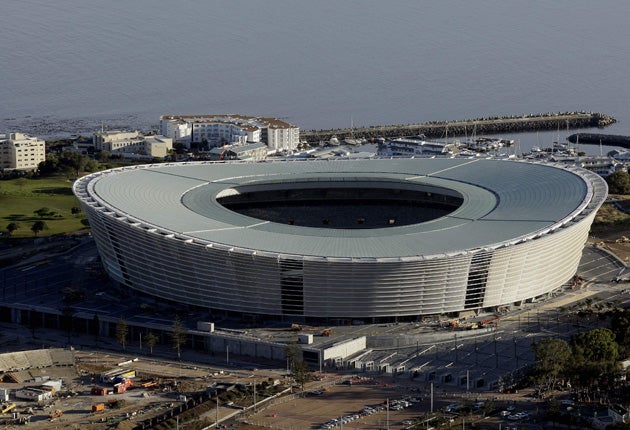South Africa's World Cup venues are 'white elephants'
Critics say South Africa has wasted resources as £370m stadium opens

Your support helps us to tell the story
From reproductive rights to climate change to Big Tech, The Independent is on the ground when the story is developing. Whether it's investigating the financials of Elon Musk's pro-Trump PAC or producing our latest documentary, 'The A Word', which shines a light on the American women fighting for reproductive rights, we know how important it is to parse out the facts from the messaging.
At such a critical moment in US history, we need reporters on the ground. Your donation allows us to keep sending journalists to speak to both sides of the story.
The Independent is trusted by Americans across the entire political spectrum. And unlike many other quality news outlets, we choose not to lock Americans out of our reporting and analysis with paywalls. We believe quality journalism should be available to everyone, paid for by those who can afford it.
Your support makes all the difference.A jubilant Cape Town last night took delivery of its spectacular £370m World Cup stadium. But elsewhere in South Africa, officials faced claims that the country has wasted resources on state-of-the-art sports facilities that will be white elephants after the final whistle is blown.
The 68,000-seat Cape Town stadium, which has taken 2,500 workers less than three years to build, was formally handed over by the contractors to mayor Dan Plato. "Cape Town stadium will become one of the world's sporting landmarks,'' he said.
Eight World Cup matches will be played there next June and July, including one semi-final. The seaside stadium, which has 37,000 sq metres of glass roofing to protect spectators from the elements, is Cape Town's most expensive building ever.
Its completion comes amid mounting claims that South Africa – where half the population still survives on an average of £130 a month – has mortgaged itself to the hilt to host a football spectacular that will bring little benefit to its people.
The country has built six new stadiums and refurbished four others to meet the specifications of football's governing body, Fifa. Among them, Soccer City in Johannesburg is now Africa's largest stadium with 95,000 seats. In September, the Finance Minister Pravin Gordhan said the government faced a 2.3bn rand (£190m) shortfall for the new venues. Corruption allegations and tender irregularities in connection with World Cup projects have prompted South Africa's Competition Commission to launch an investigation into the country's building trade.
Sowetan columnist Andile Mngxitama said: "The government has enslaved itself to an event that will turn South Africa into a playground for European tourists. When the event is over, we will still be poor."
A new documentary, Fahrenheit 2010, which was screened in Cape Town on Sunday, focuses on excesses at the £68m Mbombela Stadium, which has been built on the site of a school serving an impoverished community in Nelspruit, near the Kruger Park.
The 46,000-seater stadium, which bristles with modern technology, will be used for four matches next year, while local residents continue to live in simple dwellings without water or electricity. In January, a local politician, Jimmy Mohlala, was brutally murdered after attempting to blow the whistle on tender irregularities linked to the stadium.
The 2010 World Cup will offer the highest prize money ever, as a result of Fifa selling television and sponsorship rights for more than £2bn. South Africa had hoped that more than 450,000 foreign tourists would visit the country during the month-long tournament starting on 11 June.
However, international ticket sales are proving slow amid reports that the third phase of ticket sales, launched on 5 December, attracted fewer than 100,000 applications from non-South Africans. In total 3.8m tickets are for sale.
Cape Town stadium has attracted criticism for being located in middle-class Green Point – a long journey from Cape Town's football-loving townships. The project also ran over budget to the tune of £120m.
But Cape Town's director of communications Pieter Cronjé denied the stadium would be a white elephant. "It is true that there will be 10 hungry stadiums in South Africa after 2010. But this is a world class multi-purpose stadium in a city that is very attractive to international stars. It is a chicken-and-egg situation. Now that we have the stadium we believe the stars will come."
In numbers: The 2010 Football World Cup
£190m Shortfall on construction of six new stadiums
£2.05bn Fifa's expected take on TV rights for the tournament
£550 Top price of tickets for the final
70,000 Workers who went on strike in July
£19 Typical payment per week for stadium construction workers, with some receiving as little as £3.11 a week
500,000 Requests for tickets in 10 days since they became available
450,000 Number of foreign tourists it is hoped will visit during the month-long tournament
Join our commenting forum
Join thought-provoking conversations, follow other Independent readers and see their replies
Comments